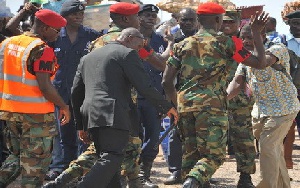The National Media Commission (NMC), has asked the Inspector-General of Police (IGP) to tame police officers who go on the rampage against journalists because such actions threaten free speech and undermine Ghana’s democratic credentials.
The Commission reminded the police administration that there are established platforms like the courts and the media regulatory body where aggrieved persons could seek redress when the media go wrong.
“I expect the IGP to send a clear warning to his men to stop harassing journalists because their actions smear the image of Ghana and threaten our democracy,” Mr Kabral Blay-Amihere, Chairman of the NMC said.
Mr Blay-Amihere who made the request on Thursday at the launch of the Media Monitoring of District Level Elections (DLEs) said free press should not attract harassment or beatings from any authority.
“The police should know better than any other institution or organisation. There are benchmarks that guide actions of enthusiastic policemen. Anytime journalists are attacked press freedom and democracy come under siege.”
He commended the Ashanti Regional Police Commander, Deputy Commissioner of Police Kofi Boakye, for swiftly condemning police personnel who recently invaded a radio station in Kumasi under the instruction of a political figure.
He, however, called on the media to exhibit high professional standards in their line of duty and stick to the ethical values.
Explaining the rationale for the media monitoring of the DLEs, Mr George Sarpong, Executive Secretary of the NMC noted that district elections usually experience low voter turn-out, partly due poor publicity.
He said as the constitutional body set up to ensure free, responsible and pluralistic media, the NMC has a key responsibility to offer the necessary policy guidance on media and decentralisation.
He said the first step towards achieving the objective of the DLEs monitoring project was to assess the qualitative and quantitative coverage of the elections.
The monitoring exercise forms part of the overall strategy of the Commission to develop the right interventions for improvement of citizen’s access to information, enhance media quality and professional standards as well as reshape the nation’s discourse towards a development dialogue.
Mr Koshen Aden, Technical Advisor to the DLEs monitoring project explained that there are two monitoring centres located in Accra and Kumasi while 40 staff have also been trained on media monitoring and techniques according to international standards.
He said the media outlets would be sort out in terms of listenership, readership and viewership and assessed to establish whether there were hate speeches or otherwise during the election period.
He urged the media to get actively involved in the election processes to give accurate and fair coverage to all candidates.
Experts described the DLEs as the most complicated elections in Ghana, pointing out that unlike presidential elections which involve 275 constituencies, DLEs entails more than 60,000 electoral areas and 300,000 units.
Regional News of Friday, 16 January 2015
Source: GNA
NMC cautions Police against attacks on journalists
Entertainment
















